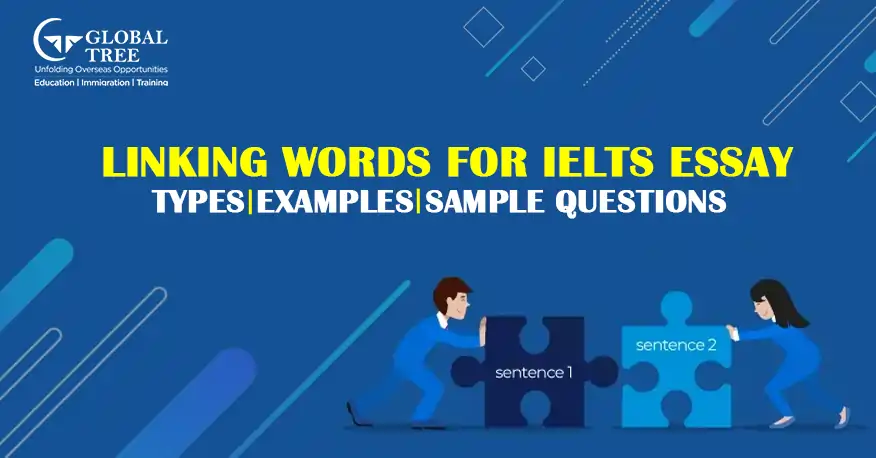Linking Words For IELTS Essay: Types, Examples, Sample Questions & More

- Introduction
- Importance of Connectors for Task 2 in IELTS Writing
- Using Linking Words in IELTS
- IELTS Essay Linking Words For Writing Task 1
- IELTS Essay Linking Words For Writing Task 2
- Types of IELTS Connectors
- IELTS Linking Words: Practice Question for Writing Task 1
- IELTS Linking Words: Practice Question for Writing Task 2
- Frequency of IELTS Essay Linking Words
- Frequently Asked Questions
Introduction
The International English Language Testing System (IELTS) is a test that is generally known and respected for measuring how well a candidate speaks English.
It has different parts, such as writing tasks that test your knowledge of English language and vocabulary.
Using linked words well is an important part of getting a good score on the IELTS writing test.
In this thorough guide, we'll talk about how important connections are in IELTS writing, look at the different kinds of connectors, and give you practise questions to help you improve.
Importance of Connectors for Task 2 in IELTS Writing
Linking words are an important part of grammar that helps the examiner read an essay better. They help build sentences and link two parts of a text that go together. Linkers can also help people say what they think in a more complete way and show that they know more and have a larger vocabulary. Here are some more reasons why linkers are important in the IELTS Prep and Exam :
- They explain the paragraph: Linking words help your essay make sense, which makes it easier for the judge to understand what you're trying to say.
- They give the written piece structure: structure is an important part of IELTS writing. Connectors help keep the flow of your writing going and make it make more sense.
- Help show how the different parts or phrases of a text fit together: Linkers show how different parts of your essay are related to each other and make it easy to move from one idea to the next.
- They give more details about a point: Linking words can be used to develop an idea, give more information, or give an example, which makes your essay more complete.
- They help you say what you think or what your point is: Connectors let you say what you think easily and show what your point is, which makes your essay more convincing.
- They help you come up with a good conclusion: Linking words are important if you want to end your essay in a way that sums up your key points and leaves an impression on the reader.
Using Linking Words in IELTS
Applicants need to know that you can't always use linking words. Also, linkers are used differently in IELTS speech than they are in IELTS writing. For example, the word "like" can be used in speech.
On the other hand, writing tasks work well with words like "here," "therefore," etc. Also, keep in mind that linkers must fit in with the rest of the line. If you try to force a link into the middle of a sentence, the sentence will sound awkward.
IELTS Essay Linking Words For Writing Task 1
Most of the time, candidates for IELTS writing job 1 are given visual information. Depending on the kind of information they are given, they have to write a 150-word report at least. Linking words in an IELTS writing for Task 1 can help you:
- Outlining the change from the description of one image to the description of the next: Connectors can help you move easily from one part of the visual to the next, making your essay more organised.
- Comparing the most important parts of each graph: By using linking words, you can compare and contrast different parts of the images, which makes your analysis more complete.
- Bringing attention to or emphasising important parts of the images: Connectors help you highlight important information in the visuals so that the reviewer sees the most important points.
IELTS Essay Linking Words For Writing Task 2
In the second job, candidates have to write an essay based on a question or a statement. Connecting words are helpful for IELTS Writing Task 2 when:
- Getting from one paragraph to the next: If you use connectors well, your essay will flow smoothly from one part to the next, making it easier to understand.
- Getting your point across: Linking words help you make your point clear and convincing, which improves the general quality of your essay.
- Giving examples and reasons: Connectors let you back up your points with examples and reasons, which makes your essay stronger.
- Explaining the results and/or conditions of different situations: Linkers are important when talking about the results or conditions of different situations because they make sure your essay is complete.
[Check out: How to master IELTS Task 1 Maps?]
Types of IELTS Connectors
Examiners look at how accurate, wide, and flexible a person's linkers and connections are to figure out how well they write. The types of links that can help you do well on the IELTS writing test are listed below:
1. Adding information: This type of linker is used to back up the main points contenders make in their essays. The following linking words in an IELTS essay lets them know that more information is coming:
- Furthermore
- Additionally
- Moreover
- And
- As well as
- In addition
- Not only, but also
- Also
2. Listing: In a statement, lists are often used to point out things. When you describe words in an essay the right way, it makes it more formal and clear. Here are a few ways to link one line to the next:
- Firstly
- Secondly
- Thirdly
- Fourthly
- Finally, lastly, or last but not the least
3. Providing examples: It's often helpful to back up thoughts with examples. Candidates must make sure to use a variety of linking words to show how their ideas fit together. Here are some examples:
- For instance
- For example
- To cite an example
- To illustrate
- Namely
- Such as
- In other words
4. Stressing and highlighting: It is important to understand what the text is trying to say. The following words help people emphasise important points in their IELTS essays so they don't get missed:
- Specifically
- Especially
- In particular
- Particularly
- Obviously
- Clearly
- Of course
5. Consequences and results: These linkers are helpful for candidates who need to explain what happened and why:
- As a result
- Therefore
- Thus
- Consequently
- For this reason
- So
- Hence
6. Causes and reasons: When writing an essay, there may be times when you need to explain why a certain point is true or what caused it. This can be done with the help of these linkers:
- Due to
- Because
- Owing to
- As
- Since
7. Contrasts and concessions: An essay often needs to include ideas that are the opposite of each other. This is important for discussion essays, in which you have to give a lot of information. The words below will help candidates show the reader when they are going to bring up a different point of view:
- Nevertheless
- However
- On the other hand
- Admittedly
- Although
- Even though
- Despite
- But
- Although
- Still
- In spite of
- Alternatively
- In comparison
- By contrast
[How to: Write an Advantage/Disadvantage Essay]
8. Conclusion: These connectors are the most useful in concluding a sentence and lend a final summary of their response:
- To sum up
- To conclude
- In conclusion
9. Providing opinion: Candidates can give their opinion in a more confident and clear way by using the following linkers:
- I believe
- I admit
- In my opinion
- I think
- I agree/concur
IELTS Linking Words: Practice Question for Writing Task 1
Here's a practice IELTS writing task with connectors to help hopefuls understand how and why to use them in IELTS writing task 1:

The graphs show several key trends. 1. ____, in general terms, somewhat more than 50% of the population owned computers in 2002. 2. ____, this figure jumped to around 78% over the coming eight years.
3. ____, these figures varied as per group. 4. ____, service members were always ahead of the general population. Roughly three-quarters of service members owned computers in 2002. That figure jumped massively to reach 80% by 2010. 5. ____ non-high school finishers began with only a 15% computer ownership rate, which climbed to around 45% in eight years.
Answers:
- To start with, firstly, first of all
- Nevertheless, however, but
- But, nevertheless, on the other hand
- You can use any example connection here except "such as," because this is the starting of a sentence.
- Any comparison connector
[How to: Answer the IELTS Writing Task 1 Pie Chart Questions]
IELTS Linking Words: Practice Question for Writing Task 2
Candidates can practice IELTS essay linking words through this practice task:
The prompt: Parents shouldn't force their kids to go into a certain field. Young people should be able to choose a career path that they are interested in.
Do you agree or disagree with this sentence?
1._____ young people must have the freedom to choose, especially in their professional path. Deep down, some parents might want their children to take up a profession that they find interesting. These wishes are completely normal and normally not harmful.
2. ____ it can turn to be harmful if these desires become strong expectations. 3. _____ freedom to a child does not necessarily mean that the parent needs to be absent. Instead, parents should have open communication with their children about their career decisions. 4.______ , if one’s dreams do not line up with their parents, they may, 5._______, fear approaching them in fear of judgment.
Answers:
- You can use any kind of opinion connector except "I agree" or "I concur." This is because it is the introductory line.
- Admittedly
- Nevertheless, on the other hand, however, but
- You can use any example connector that will fit here except ‘such as’ because this is the starting sentence.
- Accordingly, as a result, consequently, therefore, for that reason, etc.
Frequency of IELTS Essay Linking Words
If you use too many IELTS essay linking words in a paragraph, the examiner might get confused. Candidates must always remember to use the connectors wisely and where they are needed throughout the writing. If you use too many linkers, the reader will be thrown from one thought to the next. Because of this, the individual can lose a lot of points.
If you read connecting words on their own, they might not make much sense. But if the candidate puts them in a relevant situation, they can form an important message that gets the examiner's attention. So, candidates need to know a lot about IELTS essay linking words if they want to do well in this part. You can also check out these section wise tips for IELTS that may help you!
In conclusion, if you want to get a high score on the IELTS writing part, you must know how to use IELTS essay linking words well. These links not only make your writings clearer and more organised, but they also show how well you know how to use the English language. By learning about the different kinds of connections and practising how to use them, you can improve your writing skills and make it more likely that you will pass the IELTS.
Frequently Asked Questions
1. What are IELTS essay linking words, and why are they important?
A. IELTS essay linking words are words or sentences that connect different parts of an essay to make it flow better and make sense. They are important because they make your writing flow better, help you get your thoughts across clearly, and show how well you know the language.
2. How should I use linking words in IELTS writing?
A. Link words should be used in a planned way to connect ideas, move from one paragraph to the next, and back up your claims. They should make your writing easier to understand and flow better.
3. Are there specific linking words for IELTS speaking?
A. Yes, IELTS speech may use different linking words than IELTS writing. When you talk, you can use more casual connectors like "like" or "well," but when you write, you should use more official ones like "therefore" or "moreover."
4. Can using too many linking words negatively impact my score?
A. Yes, if you use too many linked words, it could hurt your score. It can make your writing hard to understand and too hard to understand. It's important to use linked words carefully and only when they're needed to make the writing make sense.
5. How can I practice using linking words effectively for IELTS?
A. To learn how to use linking words well, you can take practise tests, write essays on different topics, and ask your teachers or peers for comments. It can also help to look at examples of writings and pay attention to how linking words are used.









